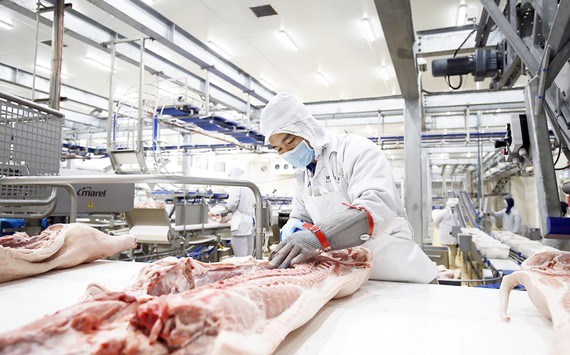Agro processing gets tidal wave of investment
Vietnamese businesses have been investing heavily in the agro-processing sector in recent years, helping it develop sustainably and effectively adapt to natural disasters and diseases.
 Illustrative image (Source: www.sggp.org.vn)
Illustrative image (Source: www.sggp.org.vn)Hanoi (VNA) – Vietnamese businesses have been investing heavily in the agro-processing sector in recent years, helping it develop sustainably and effectively adapt to natural disasters and diseases.
According to the Ministry of Agriculture and Rural Development (MARD), the sector grew 5-7 percent annually from 2013 to 2018, and export revenue accounted for about 65 percent of the total processing value.
The country now houses 7,500 agro-processing and preservation facilities that serve export activities.
In 2018-2019, construction of 30 agro-processing worth around 1 billion USD started, and many of them have already been put into operation, the ministry said.
Among those, in late 2019, Intimex Group inaugurated a 30 million USD instant coffee plant that is equipped with cutting-edge technologies and has an annual capacity of 4,000 tonnes.
“Through the project, we aim to meet the increasing demand of customers, improve competitiveness and value of Vietnamese coffee, and look towards sustainable exports,” said Intimex Chairman Do Ha Nam.
Nam said the group plans to raise the factory’s annual capacity to 20,000 tonnes in 2020, with accumulative investment amounting to 100 million USD.
Other enterprises that have scaled up operations in this sphere include Phuc Sinh JSC, TH Group, Masan MEATLife JSC, Vina T&T Group, Viet-Uc Group and San Ha Co., Ltd.
Prices of processed agricultural products are forecast to increase 7-8 percent each year by 2030, said Nguyen Quoc Toan, head of MARD’s Department of Farm Produce Processing and Development.
Products that undergo intensive processing and have high added value will make up 30 percent and above, and more than half of agro-processing facilities will be equipped with state-of-the-art technologies, he added.
Apart from investing in intensive processing technologies, businesses have changed their mindsets on food safety management and supervision.
Toan said agriculture would further develop if the sector receives more investments in intensive processing technologies, suggesting firms engage in agro-production, processing and consumption value chains.
Besides, it is necessary to improve the quality of personnel training, focusing on science-technology, the market economy and international integration, he said./.












